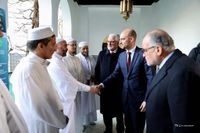In a complex web of diplomatic relations, the tensions between France and Algeria are unfolding amid contrasting messages from the French government. On March 18, 2025, Jean-Noël Barrot, France's Minister of Foreign Affairs, attended the fourth "Iftar des ambassadeurs" hosted by the Grande Mosquée de Paris, where he emphasized that France values its relationship with Algeria, a connection marked by shared interests and historical ties.
Barrot’s remarks come at a time when relations between the two nations have been tense, particularly following Algeria's refusal to accept a list of Algerians slated for expulsion from France. During his address, Barrot expressed that the ongoing tensions “are not in the interest of anyone,” underscoring his commitment to resolve conflicts with respect and integrity. He stated, “The current tensions, which we are not responsible for and which had a new problematic development yesterday, are not in anyone’s interest, neither for France nor for Algeria.”
This reconciliatory tone starkly contrasts with that of Bruno Retailleau, France's Minister of the Interior, who has openly criticized Algeria. Retailleau, who did not attend the Iftar event, is known for promoting a harder line against Algeria. He characterized Algeria's actions as an aggression, claiming, “Algeria is attacking us,” and threatened to revoke the “exorbitant advantages” that Algerian citizens enjoy, particularly regarding healthcare services in France.
Barrot defended the millions of French citizens connected to Algeria, stressing that they should not bear the brunt of the diplomatic rift the two governments are navigating. “It goes without saying that the millions of our compatriots connected in one way or another to Algeria have nothing to do with the difficulties we face today with the Algerian authorities; they have the right to tranquillity,” he asserted.
Retailleau's absence from the Iftar gathering, attributed to his disapproval of the religious nature of the event, signals a widening rift within the French cabinet regarding Algeria. His stance further formidably positions him as the lone voice advocating for a tough approach against Algerian authorities, often echoing sentiments found in far-right rhetoric.
Compounding this ideological divide, Chems-Eddine Hafiz, the rector of the Grande Mosquée de Paris, defended the mosque's role as a symbol of collaboration and peace between France and Islamic nations. During the same event that Barrot attended, Hafiz advocated for a pathway of reconciliation, expressing gratitude for Barrot’s visit. He stated, “The Grande Mosquée de Paris is at work. Its efforts counter the disciples of division who are looking today at our relations with Algeria.”
The divisions within the French government are striking, especially given Barrot's previous warnings against a needless standoff with Algeria. He has previously encouraged a more collaborative approach, indicating that partnership and open negotiations would yield more beneficial outcomes than conflict.
Hafiz called for continuing efforts toward peace, stating, “The Grande Mosquée of Paris remains serene and intends to continue along the path of appeasement and the hope for a virtuous relationship between France and Algeria.” This quote encapsulates the mosque’s role as a mediator, seeking to promote dialogue in a time of discord.
With such contrasting positions emerging from within the French cabinet, the future of Franco-Algerian relations hangs in the balance. Barrot’s statements reflect a desire for restoration, while Retailleau’s rhetoric raises concerns about potential further deterioration. As both countries navigate this sensitive political landscape, both internal and external stakeholders will be closely watching how these tensions evolve.
Barrot’s commitment to reconciling these tensions comes at a pivotal moment, as Germany's Chancellor is also looking into fostering better relations among North African nations, highlighting a broader regional interest in stability and cooperation.
Will the French government find a cohesive approach towards Algeria, or will Retailleau’s confrontational stance continue to set the tone? Only time will tell, but the signs of discord within the government underscore the fragility of diplomatic relations between these two historically intertwined nations.




